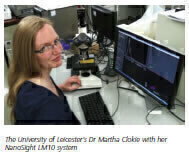News
University of Leicester uses NanoSight to Characterise Marine Viruses & Bacteriophages
Sep 17 2010
The Department of Infection, Immunity and Inflammation at the University of Leicester is using the NanoSight nanoparticle characterisation system to count bacteriophage and marine viruses.
Dr Martha Clokie, a lecturer in microbiology, is also studying the ecology and molecular biology of bacteriophages and their relationship with bacterial hosts; ranging from bacterial pathogens to environmentally
important cyanobacteria; exploiting bacteriophages and phage-derived products as an alternative to treating antibiotic resistant bacteria.
Her studies of cyanobacteria previously involved the use of plaque assays as a counting method which could use relatively large volumes of cyanobacterial culture and take up to four weeks to obtain results. Now using NanoSight’s nanoparticle tracking analysis, she is able to produce data in minutes and with no culturing required. Of her results to date, Dr Clokie says it looks to provide a very promising method with significant ease of use, time-saving advantages. “Being able to visualise the sample without dilution gives me confidence in the results. The NanoSight has also shown advantages over flow cytometry where signal to noise issues can sometimes be a problem for us. This speed of data collection will allow me to probe far more data than I could do otherwise and should really allow the cyanobacterial/phage dynamic to be probed.”
Digital Edition
Lab Asia Dec 2025
December 2025
Chromatography Articles- Cutting-edge sample preparation tools help laboratories to stay ahead of the curveMass Spectrometry & Spectroscopy Articles- Unlocking the complexity of metabolomics: Pushi...
View all digital editions
Events
Jan 21 2026 Tokyo, Japan
Jan 28 2026 Tokyo, Japan
Jan 29 2026 New Delhi, India
Feb 07 2026 Boston, MA, USA
Asia Pharma Expo/Asia Lab Expo
Feb 12 2026 Dhaka, Bangladesh



















